

Investors need to understand the uneven effects of COVID-19 across industries. The surprising traits of good remote leaders - BBC Worklife. Global management consulting. Where is technology taking the economy? Millennials are the unluckiest generation in U.S. history. Quotes from experts on the future of democracy. Why Do Corporations Speak the Way They Do? Photo: Monkey Business Images/Shutterstock This article was featured in One Great Story, New York’s reading recommendation newsletter.
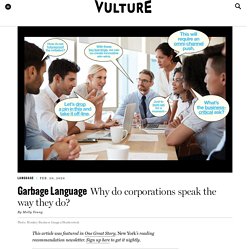
Sign up here to get it nightly. I worked at various start-ups for eight years beginning in 2010, when I was in my early 20s. Then I quit and went freelance for a while. Technology, tribalism, and truth. The technology debacle at the Iowa Caucus reinforces a national cynicism that nothing seems to work.
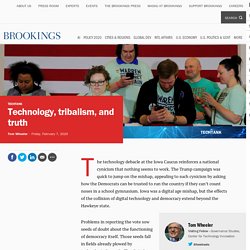
The Trump campaign was quick to jump on the mishap, appealing to such cynicism by asking how the Democrats can be trusted to run the country if they can’t count noses in a school gymnasium. Iowa was a digital age mishap, but the effects of the collision of digital technology and democracy extend beyond the Hawkeye state. Problems in reporting the vote sow seeds of doubt about the functioning of democracy itself. Why Is Social Media So Addictive? 10 tech trends that shaped the 2010s. The tech landscape has changed dramatically over the past decade, both in the United States and around the world.
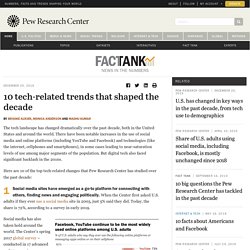
There have been notable increases in the use of social media and online platforms (including YouTube and Facebook) and technologies (like the internet, cellphones and smartphones), in some cases leading to near-saturation levels of use among major segments of the population. But digital tech also faced significant backlash in the 2010s. Here are 10 of the top tech-related changes that Pew Research Center has studied over the past decade: 1 Social media sites have emerged as a go-to platform for connecting with others, finding news and engaging politically. When the Center first asked U.S. adults if they ever use a social media site in 2005, just 5% said they did. What is monoculture? Big Endings The past year has felt like a peak in mega-budget world-spanning media spectacles that command our attention, one outrageous finale after another.
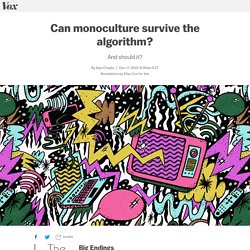
On April 26, 2019, the film Avengers: Endgame was released in the United States. Less an original narrative than an accretion of capital, technology, and celebrity, it had a budget of $356 million. By July, the movie — the closing of a phase in the vast Marvel Cinematic Universe — was the highest-grossing movie in the history of Hollywood; it has so far achieved a global box office of around $2.8 billion. A month later, on May 19, the final episode of Game of Thrones aired on HBO, the end of an eight-season run that began in 2011. 19.3 million people watched the episode, a record for the series. Keynes was wrong. Gen Z will have it worse. The founder of macroeconomics predicted that capitalism would last for approximately 450 years.
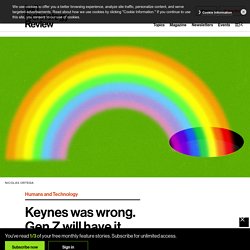
That’s the length of time between 1580, when Queen Elizabeth invested Spanish gold stolen by Francis Drake, and 2030, the year by which John Maynard Keynes assumed humanity would have solved the problem of our needs and moved on to higher concerns. It’s true that today the system seems on the edge of transformation, but not in the way Keynes hoped. Gen Z’s fate was supposed to be to relax into a life of leisure and creativity. Instead it is bracing for stagnant wages and ecological crisis. Social Media Is Warping Democracy. The End of Babies. In the fall of 2015, a rash of posters appeared around Copenhagen.

One, in pink letters laid over an image of chicken eggs, asked, “Have you counted your eggs today?” A second — a blue-tinted close-up of human sperm — inquired, “Do they swim too slow?” The posters, part of a campaign funded by the city to remind young Danes of the quiet ticking of their biological clocks, were not universally appreciated. They drew criticism for equating women with breeding farm animals. The timing, too, was clumsy: For some, encouraging Danes to make more babies while television news programs showed Syrian refugees trudging through Europe carried an inadvertent whiff of ugly nativism. Dr. But the campaign also notably failed to land with some of its prime targets, including Dr. The 2010s Have Broken Our Sense Of Time. This is one of those places you go for Instagram.

The Manhattan Bridge looms, immediate and substantial, over a cobblestone street, framed on either side by a pair of old brick buildings; if you’re standing in the right spot, you can see the Empire State Building through one of the bridge’s uprights. Imagine a woman, young and ambivalent, staring into the middle distance, white sneakers aglow in the dawn, bridge overhead. This area of Brooklyn, once home to abandoned factories and warehouses, now hosts an annual festival for $3,000 German cameras.
Free college won’t be enough to prepare Americans for the future of work. As the Democratic presidential candidates gather in Westerville, Ohio for the fourth primary debate on Tuesday, they would do well to acknowledge the growing public concern about the “future of work.”
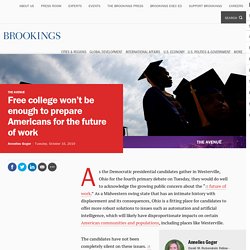
As a Midwestern swing state that has an intimate history with displacement and its consequences, Ohio is a fitting place for candidates to offer more robust solutions to issues such as automation and artificial intelligence, which will likely have disproportionate impacts on certain American communities and populations, including places like Westerville. The candidates have not been completely silent on these issues. Andrew Yang and Pete Buttigieg have elevated the potential problems of digital transformation and its tendency to exacerbate inequality. Meanwhile, the most common responses that candidates have given to questions about rising inequality have focused on either “free college” or enhancing college access more broadly. Definitions: Education and training pathways.
Steep learning curve draws UK graduates to consulting. How America Lost Faith in Expertise. In 2014, following the Russian invasion of Crimea, The Washington Post published the results of a poll that asked Americans about whether the United States should intervene militarily in Ukraine.
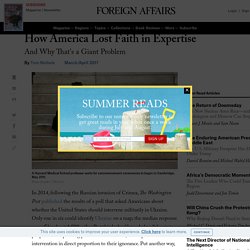
Only one in six could identify Ukraine on a map; the median response was off by about 1,800 miles. But this lack of knowledge did not stop people from expressing pointed views. The Hidden Costs of Automated Thinking. Like many medications, the wakefulness drug modafinil, which is marketed under the trade name Provigil, comes with a small, tightly folded paper pamphlet.
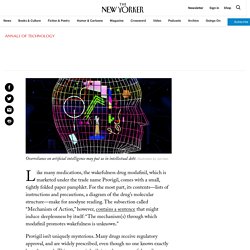
For the most part, its contents—lists of instructions and precautions, a diagram of the drug’s molecular structure—make for anodyne reading. The subsection called “Mechanism of Action,” however, contains a sentence that might induce sleeplessness by itself: “The mechanism(s) through which modafinil promotes wakefulness is unknown.” Broken capitalism. We need to rethink our economic assumptions. Internet capitalism pits fast technology against slow democracy. Technology-driven changes—like those we are presently experiencing—produce demands for security and stability that pose a threat to liberal democracy and capitalism. Across the world, autocrats are on the rise because they claim they can deliver answers; symbols such as Brexit or the Wall pose as solutions; and old economic “isms” are reborn as “new” solutions. This is not a unique experience; our struggles in the information age echo similar struggles in the industrial age. When change attacks at gigabit speed, the quest for solutions also accelerates.
It took the telephone a leisurely 125 years to connect one billion people. The Android mobile phone, in contrast, reached the same milestone in less than six years. Liberal democracies, however, are hard to condense. For democracy to produce such a resolution, it requires two external accelerants. The second criteria necessary for democracy to work is for us to overcome our inherent tribal instincts and band together. The Interpreter: New Zealand's lesson about how the internet changes us all - skiplumley - Gmail.
Is this AI? We drew you a flowchart to work it out. What is AI, exactly? The question may seem basic, but the answer is kind of complicated. In the broadest sense, AI refers to machines that can learn, reason, and act for themselves. They can make their own decisions when faced with new situations, in the same way that humans and animals can. As it currently stands, the vast majority of the AI advancements and applications you hear about refer to a category of algorithms known as machine learning (see "What is machine learning?
"). These algorithms use statistics to find patterns in massive amounts of data. Machine learning, and its subset deep learning (basically machine learning on steroids), is incredibly powerful. The grand idea is to develop something resembling human intelligence, which is often referred to as “artificial general intelligence,” or “AGI.” Www.forbes. The Era of Limited Government Is Over. Real Estate Is The New Gateway To The Ivy League For International Parents. Zaha Hadid 520 W 28 Photo Credit: GettyGetty Gaining admission to the nation’s most elite universities is only growing more competitive, as the number of qualified applicants, and the number of schools those applicants apply to, increases. For international students, the process can be even more difficult, with English proficiency tests, the difficulty of taking US standardized tests overseas and obtaining student visas in the current political climate.
Although the largest percentage of international students at US colleges and universities (30%) are Chinese (followed by 19% from India), gaining entry to the US’s most selective schools is increasingly difficult. This year, not a single student from China was admitted early to MIT and admissions to elite schools is overall trending downwards. Why we need to rethink education in the artificial intelligence age. Model Metropolis. Tucker Carlson Was Right About the Working-Class Family. Brookings. Brookings. IBM's HR Chief Shares Best Advice On The Future Of Work. When it comes to the forefront of the global human resources landscape, Diane Gherson is someone you want to know. As Chief Human Resource Officer at IBM, Diane has helped to revolutionize IBM over the past 13 years. Under her leadership, she has transformed global workforce outcomes through talent analytics and data, with special emphasis on predictive analytics. I interviewed Diane to learn her thoughts on several topics, including the future of work, how technology is disrupting human resources, how to build a lasting culture, the best way to give feedback, her favorite interview question, her best career advice and where she eats breakfast.
Zack Friedman: It’s no secret that technological innovation brings rapid disruption. 20 top lawyers were beaten by legal AI. Here are their surprising responses. An Alternative History of Silicon Valley Disruption. “I Was Devastated”: Tim Berners-Lee, the Man Who Created the World Wide Web, Has Some Regrets. “For people who want to make sure the Web serves humanity, we have to concern ourselves with what people are building on top of it,” Tim Berners-Lee told me one morning in downtown Washington, D.C., about a half-mile from the White House.
Berners-Lee was speaking about the future of the Internet, as he does often and fervently and with great animation at a remarkable cadence. With an Oxonian wisp of hair framing his chiseled face, Berners-Lee appears the consummate academic—communicating rapidly, in a clipped London accent, occasionally skipping over words and eliding sentences as he stammers to convey a thought. His soliloquy was a mixture of excitement with traces of melancholy. Nearly three decades earlier, Berners-Lee invented the World Wide Web. On this morning, he had come to Washington as part of his mission to save it. At 63, Berners-Lee has thus far had a career more or less divided into two phases. Why are we so confident? Beneath the U.S. job numbers: Tech’s influence on the workforce continues to hollow out the labor market. How to Program Your Job. Jobs that are safe from automation. - The Washington Post. - The Washington Post. Digitalization and the American workforce.
What the future of work will mean for jobs, skills, and wages. In an era marked by rapid advances in automation and artificial intelligence, new research assesses the jobs lost and jobs gained under different scenarios through 2030. The technology-driven world in which we live is a world filled with promise but also challenges. Cars that drive themselves, machines that read X-rays, and algorithms that respond to customer-service inquiries are all manifestations of powerful new forms of automation. KnightFoundation AmericansViews Client Report 010917 Final Updated. A New Year’s resolution to address wage inequality in firms. As I was making my New Year’s resolutions a few days ago, I found myself distracted by an old item of news.
10 Dumb Mistakes Smart People Make When It Comes To Finding Their Purpose. How AI could transform the way we measure kids' intelligence. Deep Learning Is Going to Teach Us All the Lesson of Our Lives: Jobs Are for Machines. Labor 2030: The Collision of Demographics, Automation and Inequality. Tech companies should stop pretending AI won’t destroy jobs. What Kurt Vonnegut Can Teach Us About Coping with the Internet. Students don't pursue STEM because it's too hard, say 52% of Americans.